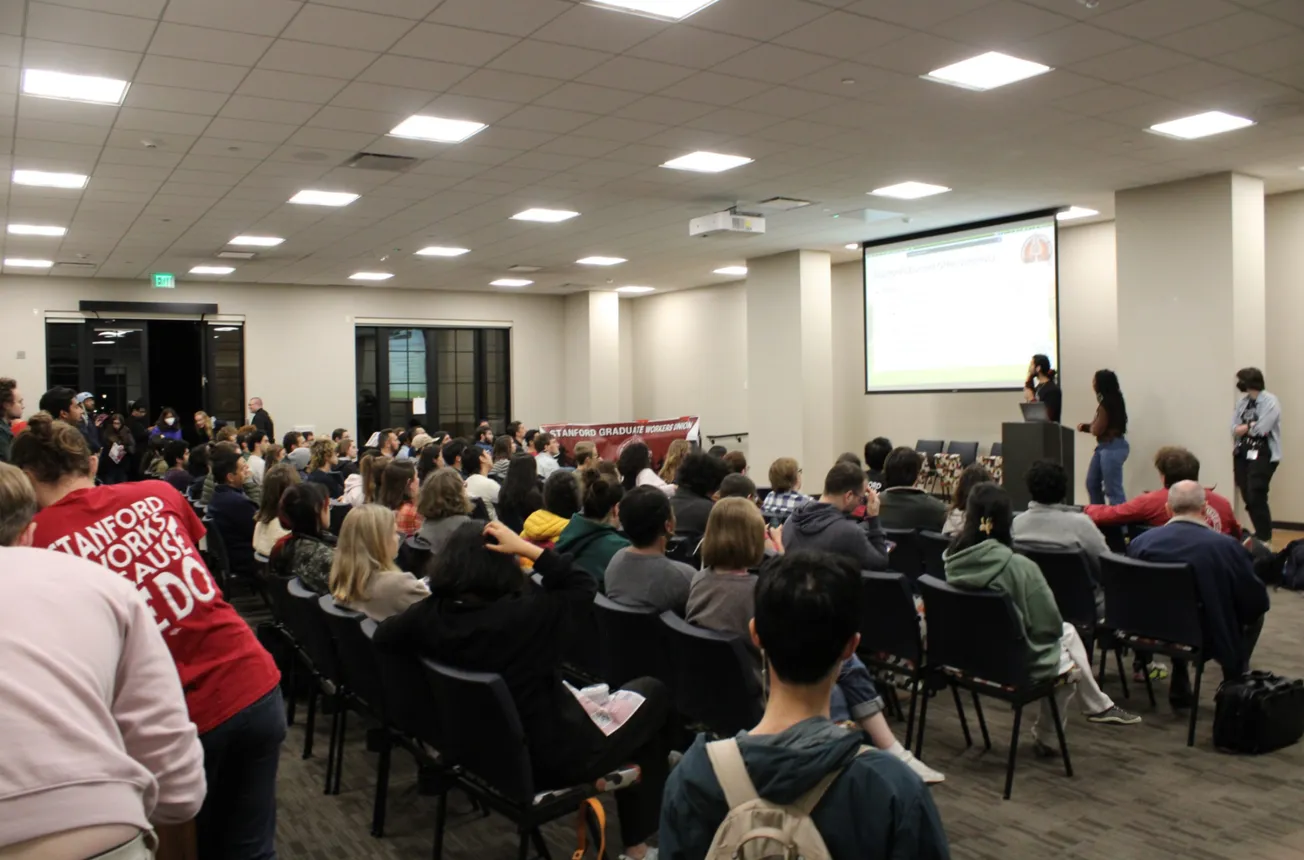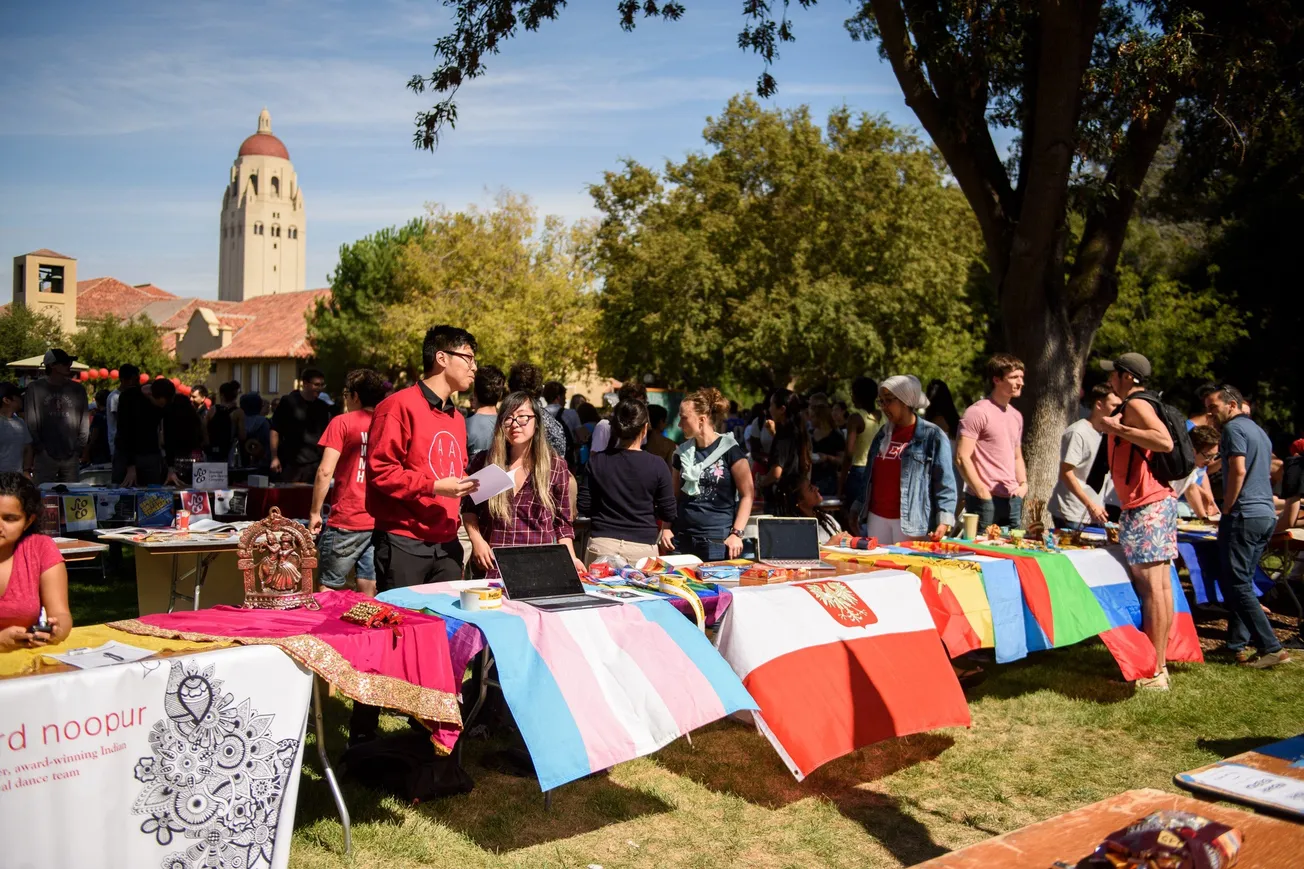Table of Contents
On June 27th, many graduate students on campus received an ominous email titled “Termination Request” sent by Stanford Graduate Workers Union (SGWU) leadership, including Liam Sherman, the Vice-President for Membership, and Orisa Coombs (who signed off on her emails as “UE Local 1043 President”), the president of the SGWU. The emails demanded that university administrators terminate the students immediately for simply failing to pay dues to the Union, as mandated by the recent collective bargaining agreement signed between the University and the student union in 2024.
Some graduate students on campus have objected to joining the student union, which is affiliated with and sends money to the United Electrical Workers (UE), a nationwide union that funds progressive activism. The Union is now attempting to employ aggressive methods of extracting payments from graduate students to the tune of several hundred dollars.
While students have the technical option to pay “agency fees” if they do not wish to be a member of the Union and participate in its democratic processes, these fees amount to the same cost as Union dues and still go to the Union.
The student Union has been mired in controversy since its creation for its performative leftism and brash demands. Students who received the email requesting their termination were also copied on identical emails sent to Stanford’s Employee & Labor Relations (ELR) team.
In their response to the Student Union termination requests for each student, ELR treaded lightly, simply acknowledging receipt of the demands and requesting a follow-up meeting with the SGWU. What they did note, however, is that the Union’s demands were unprecedented.
These termination requests were the first time that the SGWU had ever requested that Stanford use their authority to terminate a fellow graduate student, whom they viewed as an employee who was mandated to pay dues towards it.
The University has yet to make a decision on the matter and maintains it may still comply with the Student Union’s demands to fire students. In a response to an email sent by the Review, the university administration (ELR) replied, “However, pursuant to the CBA, Stanford *may* be required to terminate graduate student workers at the request of the union if they are not in compliance with Article 3 of the CBA.”
The Union was first formed in July 2023, and the University signed a collective bargaining agreement (CBA) with the Union in October 2024 to avoid a graduate worker strike.
Congruent with its history of prior controversies, these threats fit into a wider pattern of pressure by SGWU to force submission to the Union’s demands. Multiple students reported that not only did the SGWU threaten termination, but escalated their campaign to the level of harassment, as students were repeatedly texted on personal cell phone numbers, which were never given with consent to the Union. Furthermore, many graduate students remain unaware that union dues (1.44 percent of their stipend) are automatically deducted from their stipends. A graduate student must opt out to avoid automatic withdrawals from their payment.
The behavior of the SGWU calls into question the legitimacy of their demands, especially given that Harvard recently removed 800 graduate students on research stipends from the Harvard Graduate Student Union. Harvard made a crucial distinction between academic research and employment, stating that simply receiving a stipend for research to further scholarship does not imply compensation. It is clear that university students are not equivalent to blue-collar workers, and allowing them to unionize as such is dubious.
Called into further question, however, is the politics and organization of the SGWU. Given its problematic behavior and rash ultimatums to students, does the SGWU truly advance the interests of Stanford’s PhD students, or is it a front for a faction of progressive political activists who aim to advance their progressive goals and exert control over graduate life?
A cursory look, even into SGWU’s own website, draws serious doubt on the former possibility. As revealed on the website, a staggering amount (roughly two-thirds) of student dues are NOT used by the SGWU, but are rather largely funneled towards the United Electrical, Radio and Machine Workers of America (UE), the national union under which SGWU was formed as a local chapter.
Not only does a significant portion of dues sent to UE get funneled to paying salaries for the national organization, but the Union doles out money to a laundry list of progressive causes. A page titled “political action” is prominently displayed on its webpage and endorses highly political progressive causes such as the anti-Trump “No Kings” protests. Union Electric publicly lists a whole host of causes it supports, ranging from abortion to immigration.
While SGWU may be acting within its rights as laid out by the contract, its actions are clearly an affront to the interests of the scholars it claims to represent. Instead of acting as a neutral advocate for the concerns of Stanford graduate students, the sources the Review spoke with alleged that it more closely resembles a protection racket.
From their repeated harassment of students opposed to their operations, to the fact that the money they raise goes to a national organization that funds political pet projects and the salaries of professional activists, the SGWU represents a grift more than it does genuine protection of students. Graduate students, who typically receive only modest stipends, are being forced to sacrifice many hundreds of dollars annually to the altar of a small, leftist cabal of activists that do not represent the interests of most graduate students.
In short, the SGWU extracts money from graduate students and then funnels it towards an organization that spends it on nebulous progressivism and internal bureaucracy, with little oversight or relevance to graduate student life. Their intimidation tactics to shake down students are, unfortunately, supported by a collective bargaining agreement agreed to by the university after caving to threats of a strike.
Stanford has a duty not to use its power as the purported “employer” of graduate students to bend to the will of the radical SGWU. The university’s own equivocation on actually enforcing Article 3 of the CBA demonstrates the open brazenness of the Union.
The University has the power to rectify this situation and prevent the firing of objectors to the SGWU. Not only can they refuse to comply with the Union’s demands, but they could, like Harvard, reclassify graduate students as scholars rather than Union workers, and protect them against harassment from progressive unionists.
Stanford must do the right thing and protect its graduate students, whether they toe the progressive Union line or not.





